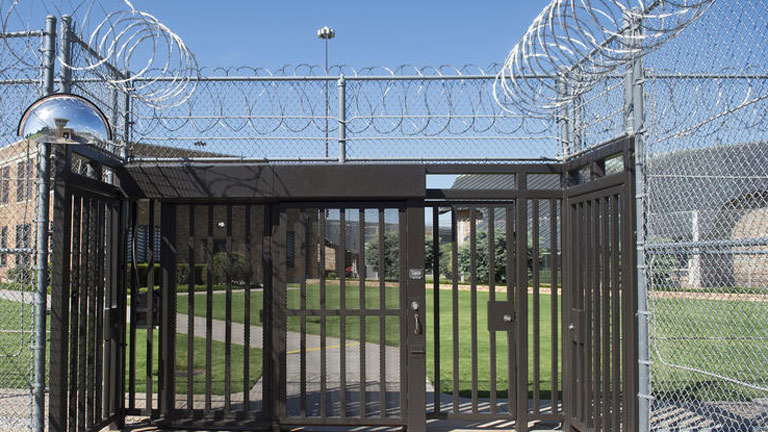Alum’s Career Path Leads to Federal Prison — As Warden

As warden of the Federal Correctional Institution at El Reno, Okla., NC State alumnus Tommy Scarantino runs the equivalent of a small city, complete with a farm, factory and all of the staff required to supervise and care for more than 1,400 inmates, many of them violent.
So when the director of the Federal Bureau of Prisons called last summer to share that President Obama would be making an historic visit to the facility, Scarantino (Political Science ’95) was incredulous. “I asked if he was kidding,” Scarantino says. “He was serious.”
On July 16, Obama, who has called for legislation to change sentencing rules, spent about five hours at the prison. He met with Scarantino and other prison officials and spoke with six inmates. The visit was documented in the HBO series VICE. It was the first time a sitting president ever visited a federal prison.
Scarantino, who lives in Oklahoma City with his wife and two children, had just two weeks to prepare for the visit. Unless there is a major disturbance, weapons aren’t allowed inside the facility. But, on the day of Obama’s visit, there were exceptions — 50 Secret Service agents, snipers on the roof tops and Obama’s armored vehicle, which could never be too far away.
“It was fascinating to see how they work and how they prepare for a visit,” Scarantino says.
During a walk across the compound, Obama asked Scarantino about his 22-year career and the changes he’s seen in the federal system during that time. “He is a very nice guy, very personable,” Scarantino says.
The visit was a crowning moment in Scarantino’s career, which began in 1994 at the Federal Correctional Institution in Butner, N.C., even before he graduated from NC State. There, he served in a co-op program as a case manager, helping inmates during their time in the prison. After graduating, he spent a decade at Butner, first as a correctional officer and later as a case manager.
Then he started working his way up the Bureau of Prisons system, moving to higher positions at institutions in West Virginia and Los Angeles, Calif. For nearly three years, he served as the correction programs administrator in the bureau’s central office in Washington, DC. He was promoted to warden in El Reno in February 2015.
El Reno houses about 1,100 inmates in a medium security facility. Another 300 inmates stay at a minimum security satellite camp where they do landscaping, grounds maintenance and work on the 4,000-acre farm, which includes 2,000 head of cattle. The farm, one of only two in the system, provides all of the milk for the 27 federal correctional institutions in the region. The prison also has a metal factory, where inmates learn skills and make shelving, lockers and other items for the military and other federal agencies.
“I find it to be exciting dealing with criminals and reading about some of these cases,” Scarantino says. “There are a lot of high-profile cases in the Federal Bureau of Prisons.”
Scarantino can’t talk specifics about the prisoners under his watch, but he can name some of them. Former investment adviser Bernie Madoff is serving time in Butner. Kwame Kilpatrick, the former mayor of Detroit who is serving a 28-year sentence for racketeering, among other charges, is in El Reno. “He’s here. He’s doing fine” is about all Scarantino can say of the former elected official.
But El Reno isn’t full of just white collar criminals. About 60 percent of inmates are serving time for drug offenses. Others have committed murders, sex offenses, bank robberies and other violent crimes. Prison officials have to keep a close watch on gang affiliation, screening inmates to ensure that a facility has no rival gang members, Scarantino says.
El Reno is considered a “Texas yard,” which means only inmates who are members of Texas-based gangs can be housed there. If gangs from other areas — such as California or Mexico — were moved there, it could cause a riot, Scarantino says.
“It’s not for everyone,” he says. “It’s a dangerous job.”
Scarantino, 43, has less than a decade left before he plans to retire from the bureau at the age of 50. He has his sights set on other leadership roles within the federal agency. But, if the final destination is El Reno, Scarantino, whose father spent 28 years working for the bureau, is happy with that, too.
“I’m not done yet,” says Scarantino, who makes it back to Raleigh for a Wolfpack game or two each year. “I’m enjoying this role.”
—Sarah Lindenfeld Hall
This article originally ran on NC State’s Red and White for Life Alumni Blog.



